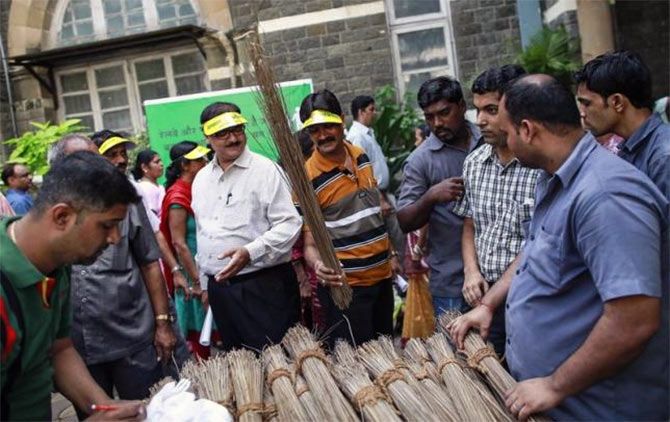The law of diminishing returns catches up as one goes up the ladder, notes Shyamal Majumdar.

Pay scales at the lower levels of government have been higher than those in the private sector for some time now.
The gap has widened after the report of the Seventh Central Pay Commission, which had engaged the Indian Institute of Management, Ahmedabad, to conduct a study to get a comparative picture of the salaries paid in the government and the private sector.
According to the study, the total emoluments of a "general helper", the lowest-ranked employee in government, is Rs 22,579, more than twice that of his peer in the private sector.
The recommended minimum pay in government is Rs 18,000 per month, which the commission said would be enough to "ensure a decent standard of living", along with other allowances and facilities.
That's because besides dearness allowance, the government provides house rent, transport, location and function-specific allowances apart from leave travel allowance.
Add job security to that, and you get a sense of why government - both central and state - jobs at the lower level are so much in demand.
Just two months ago, the Uttar Pradesh government received 2.3 million applications for 368 jobs, prompting a state government official to tell Reuters that it would take more than three years to interview the candidates, all of whom were eligible, according to the requirement of a primary school certificate and a licence to ride a motorbike.
The jobs pay Rs 16,000 a month and involve making tea and passing files between government offices.
The number of applications for the jobs is 16 times that in 2006 - the last time the state government recruited for similar jobs.
That's just one side of the problem. While government salaries at the lower level are attractive, it's exactly the opposite as one climbs up the ladder.
That's because the ratio of the minimum to maximum pay in government has to be within an "acceptable" band of 1:12.
This is absurd, as at the top level, or what is called the "A Grade", the government competes for the same pool of manpower as the private sector.
So how will the government attract high-quality talent at the top? As a comparison, look at the ratio of minimum to maximum pay in private sector jobs.
As Business Standard reported recently, the top brass of Nifty companies, on an average, earned 170 times what an average staff member earned in these companies in FY15.
Of the 95 directors belonging to 34 private sector firms in the Nifty, 11 had remuneration in excess of 400 times the median average staff pay.
An analysis of pay ratio disclosures of Nifty companies by InGovern, a Bengaluru-based corporate governance research and advisory firm, showed the average remuneration of a director of a Nifty company was Rs 9 crore (Rs 90 million), whereas the average median employee remuneration was Rs 5.87 lakh.
This may be excessive but is a reality.
The government obviously cannot pay this kind of salary and there is considerable debate about whether this kind of gap between the minimum to maximum pay is acceptable.
So the only solution seems to be to allow academics and private sector analysts to laterally enter government service on a fixed-term contract.
For example, several countries including the US, routinely induct private sector analysts and academics specialising in regions, sectors or languages to beef up traditional strengths in the Foreign Service.
In India, some of the ministries and the banking regulator have started this, but with mixed results.
Such proposals are invariably viewed with caution by sections of the serving officers, who are fiercely protective of their turf.
Also, typically, such appointments are viewed as limiting promotional opportunities or plum postings, creating a hostile ecosystem for outsiders.
A senior private sector executive says these are all factors that dissuade talent from joining a government job and even if they do, they leave after a few years of service.
The private sector, he says, treats the government as a training ground for some of the best people, as they are involved in processes where the decision-making takes into account the interests of every stakeholder.
So, they are good at taking a holistic view. And money is not an issue because of the relatively poor pay at the senior level in government.
So pay commission, or no pay commission, the talent exodus looks set to continue from government jobs.











